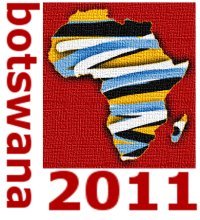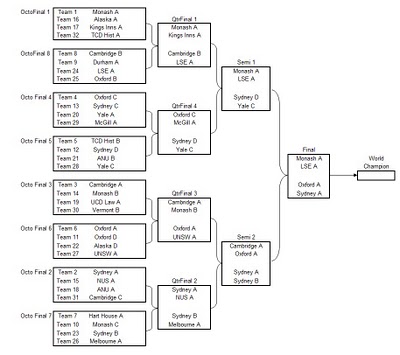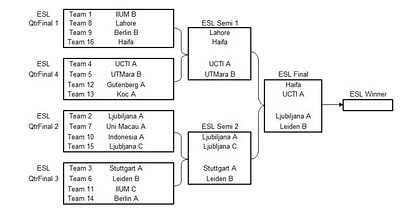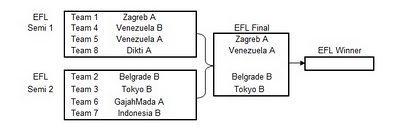WUDC 2011: Sieger, Ranglisten, Setzungen und Themen
 Die Bezeichnung „Worlds“ wird nicht umsonst im Plural verwendet: Zahlreiche Sieger und Gewinner wurden in Botsuana gekürt. Doch zuvorderst geht es um die drei besten Teams, die sich in den Kategorien „Open Break“, „English as a Second Language“ (ESL) und „English as a Foreign Language“ (EFL) gegen rund 300 Teams aus aller Welt durchgesetzt haben: Monash A aus Australien, Haifa A aus Israel und Tokyo B aus Japan. Die besten 32 Teams hatten es am vergangenen Freitag nach neun Vorrunden ins Achtelfinale geschafft.
Die Bezeichnung „Worlds“ wird nicht umsonst im Plural verwendet: Zahlreiche Sieger und Gewinner wurden in Botsuana gekürt. Doch zuvorderst geht es um die drei besten Teams, die sich in den Kategorien „Open Break“, „English as a Second Language“ (ESL) und „English as a Foreign Language“ (EFL) gegen rund 300 Teams aus aller Welt durchgesetzt haben: Monash A aus Australien, Haifa A aus Israel und Tokyo B aus Japan. Die besten 32 Teams hatten es am vergangenen Freitag nach neun Vorrunden ins Achtelfinale geschafft.
Die Top-32-Teams
1. Monash A
2. Sydney A
3. Cambridge A
4. Oxford C
5. TCD Hist B
6. Oxford A
7. Hart House A
8. Cambridge B
9. Durham A
10. Monash C
11. Oxford D
12. Sydney D
13. Sydney C
14. Monash B
15. NUS A
16. Alaska A
17. Kings Inn A
18. ANU A
19. UCD Law A
20. Yale A
21. ANU B
22. Alaska B
23. Sydney B
24. LSE A
25. Oxford B
26. Melbourne A
27. UNSW A
28. Yale C
29. McGill A
30. Vermont B
31. Cambridge C
32. TCD Hist A
Neben dem Teamranking gibt es eine Hitliste der Top-Redner, die sich aus der Summe der Rednerpunkte nach den neun Vorrunden errechnet. In diese Charts haben auch drei Redner aus VDCH-Clubs Einzug gehalten: Patrick Ehmann von der Berlin Debating Union (BDU) und Michael Saliba und Andreas Lazar vom Debattierclub Stuttgart (DCS).
Top-Ten-Redner der Worlds 2011
1. Victor Finkel (Monash A)
2. Tim Mooney (Sydney A)
3. Fiona Prowse (Monash A)
4. Ben Woolgar (Oxford A)
4. Bronwyn Cowell (Sydney A)
6. Doug Cochran(Cambridge A)
7. Patrick Caldwell (Sydney B)
8. Niamh Ni Mhaoileoin (TCD Hist B)
9. Brent Kettles (Hart House A)
10. Stephanie Bell (Oxford C)
Top-Five-Redner in der Kategorie ESL
1. Filip Dobranić (Ljublijana A)
2. Maya Cimmerman (Ljublijana A)
3. Rob Honig (Leiden B)
4. Michael Saliba (Stuttgart A)
5. Patrick Ehmann (Berlin A)
Top-Five-Redner der Kategorie EFL
1. Andreas Lazar (Stuttgart A)
2. Simon Belak (Ljubljana C)
3. Riza Aryani (Bating Society Universitas Indonesia)
4. Eldhianto Maulana Jusuf (Gadjah Mada)
5.Yunizar Adiputera (Gadjah Mada)
Übrigens: Andreas und Michael haben es als Team Stuttgart A bis ins Halbfinale des ESL-Breaks geschafft. Weitere deutsche Teams sind immerhin erst am ESL-Viertelfinale gescheitert: Gutenberg A (Mainz) mit Marcus Ewald und Marietta Gädeke, Berlin B mit Dessislava Kirova und Florian Umscheid und Bastian Laubner und Patrick vom Team Berlin A. Damit stellten die vier deutschen Teams ein Viertel des ESL-Viertelfinalbreaks. Schießlich stand auch eine Deutsche im Finale: Isabelle Loewe (Debattierclub Bonn) jurierte das „grand final“ im Open Break, aus dem Monash A als Sieger hervorging.
Die „draws“, das heißt die Teamsetzungen in sämtlichen Finalrunden, haben wir noch einmal im Überblick für Euch, zusammengestellt hat sie Colm Flynn auf seiner World Debating Website.
Der Open Break
Der ESL-Break
Der EFL-Break
Neben den üblichen Verdächtigen werden weitere Meister ermittelt und ausgezeichnet: In der Kategorie „Public Speaking“ setzte sich Crystal Thompson aus Jamacia gegen Jack Gamble und Danny Blackman durch. Sieger der Comedynacht wurde Wudi Wu (Kanada). Beim Masters‘-Wettstreit debattierten vier Teams aus Irland, Schottland, England und den USA zum Thema „This house prefers a philosopher king to a tyrannical democracy.“ Gewonnen haben Alex Just und UB McKaiser aus Schottland.
Sämtliche Themen im Überblick – die Vorrunden:
- 1. Vorrunde: This house believes that national sporting teams should reflect the diversity of the national population.
- 2. Vorrunde: This house believes that all countries should have the right to possess nuclear weapons.
- 3. Vorrunde: This house believes that governments should not provide benefits on the basis of marital status.
- 4. Vorrunde: This house believes that independent central banks should set limits on government spending.
- 5. Vorrunde: This house would prioritise asylum seekers who have engaged in armed struggle against oppressive regimes.
- 6. Vorrunde: This house would deny Teachers Unions the right to strike.
- 7. Runde: This house would require individuals to reveal their actual identity when communicating on the internet.
- 8. Vorrunde: This house believes that the Southern Africa Development Community should pursue political union.
- 9. Vorrunde: This house believes that social movements should use the courts rather than the legislature to advance social change.
English as a Foreign Language:
- EFL-Halbfinale: This house supports a one state solution for the Israeli-Palestinian conflict.
- EFL-Finale: This house would give more votes to the poor.
English as a Second Language:
- ESL-Viertelfinale: This house believes that domestic courts should try foreign nationals who commit war crimes abroad.
- ESL-Halbfinale: This house would prefer that the children of racial minorities be adopted by parents of that race.
- ESL-Finale: This house believes that courts should break up consistently dominant political parties.
Open Break:
- Achtelfinale: This house would buy countries’ votes in international organizations.
- Viertelfinale: This house believes that courts should not enforce wills that discriminate on the basis of race.
- Halbfinale: This house opposes organised religion.
- Finale: This house would invade Zimbabwe.
apf / glx








